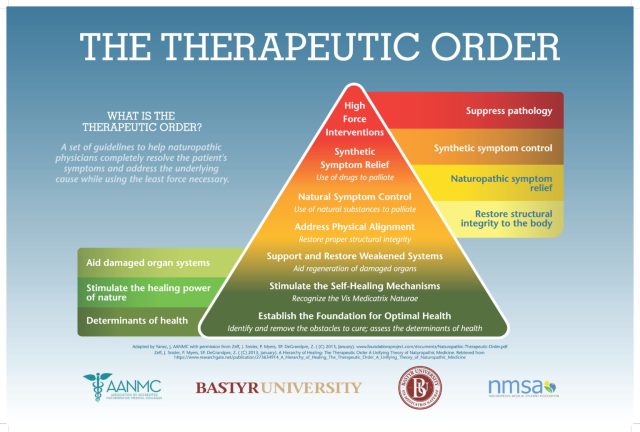
Naturopathic medicine is a distinct system of healthcare that skillfully combines natural therapeutic traditions with modern science to restore and optimize health. Naturopathic physicians believe in restoring and maintaining their clients’ optimal health by emphasizing nature’s inherent self-healing process. The body is inherently wise and can heal itself in the right conditions and environment. This is accomplished through education and the rational use of natural therapeutics.
Naturopathic Medicine holds that the primary role of the physician is to restore health, and is based on 4 different assumptions.
- The Universe is ordered and intelligent as is evident at the most minute levels of anatomy, physiology, chemistry and biology, and the order and intelligence we see in the body reflects the order we see in the universe.
- Health is the natural state of humanity, and illness is an adaptive response to disturbances in function.
- Correction of the disturbance should result in the return of the normal healthy state.
- Interventions should involve the least force necessary to accomplish this.
Licensed Naturopathic Doctors (NDs) are trained to provide primary care and to diagnose and treat patients of all ages, genders, and conditions. During a naturopathic medical visit, a comprehensive biological, psychological, and social history is obtained. Physical examination and diagnostic tests may be included in order to reach an accurate medical diagnosis. Therapeutic interventions may include clinical nutrition, botanical medicine, homeopathic medicine, physical medicine, behavioral medicine, and lifestyle recommendations.
The ultimate goal of naturopathic care is to support the body’s innate capacity to heal by treating the whole person with an individualized plan and teaching the patient how to prevent further illness.
Naturopathic doctors (NDs) are educated and trained at accredited naturopathic medical colleges. Naturopathic care is guided by the Therapeutic Order. The Therapeutic Order delineates the natural sequence and prioritization of care, providing the greatest benefit with the least potential for side effects.

The Therapeutic Order
1. Remove Obstacles to Health. The first step in returning to health is to remove the entities that disturb health such as poor diet, digestive disturbances, chronic stress levels, maladaptive coping mechanisms, inadequate sleep, and exercise. Naturopathic doctors create patient plans based on an individual’s “obstacles to health” in order to change and improve the terrain in which the disease developed. This allows additional therapeutics to have the most beneficial impact.
2. Stimulate the Self-Healing Mechanisms. NDs use therapies to stimulate and strengthen the body’s innate self-healing and curative abilities. These therapies may include clinical nutrition, botanical medicine, constitutional hydrotherapy, homeopathy, mind-body medicine, and acupuncture.
3. Restore Weakened Systems. Naturopathic medicine recognizes and honors the interconnectedness of the body’s organ systems. NDs will identify imbalance and work to restore optimal function.
4. Correct Structural Integrity. Physical modalities such as spinal manipulation, massage therapy, physiotherapy, therapeutic exercise, and craniosacral therapy are used to maintain and improve the musculoskeletal system.
5. Use Natural Substances to Restore and Regenerate. Naturopathic medicine’s primary objective is health restoration. When a specific pathology must be addressed, NDs prioritize safe and effective natural substances that minimize toxicity or additional burden on an already distressed system.
6. Use Pharmacologic Substances to Halt Progressive Pathology. NDs are trained in pharmacology and how to use pharmaceutical drugs when necessary. They are experts in identifying drug-herb and drug nutrient interactions as well. As jurisdictional scope permits, NDs prescribe or refer to medical colleagues as appropriate.
7. Use High Force, Invasive Therapies. When necessary, NDs can refer for more invasive therapies like surgery. NDs work as part of a health care team to support optimal patient outcomes. They may recommend therapies that minimize side effects and enhance the efficacy of more invasive treatments.
Naturopathic Training
NDs have extensive training in Behavioral Medicine, which enables them to empower patients to make and sustain lifestyle changes that improve health. Because of their rigorous training, naturopathic doctors go beyond treating physical symptoms; they help patients understand and address the underlying social, emotional, and psychological patterns that influence health. Naturopathic doctors are trained to utilize a broad range of therapies, counsel patients on lifestyle medicine, and incorporate comprehensive approaches to stress reduction.
Naturopathic medical education (NME) curricula is a comprehensive, rigorous, and well-rounded scientific medical education that is both comparable and complementary to that of MDs and DOs. NME incorporates a foundation in biomedicine, cutting edge natural therapies, and supervised clinical application of classroom knowledge. Naturopathic doctors demonstrate competence through a two-part standardized licensing examination and are required to maintain that competence through continuing education.
